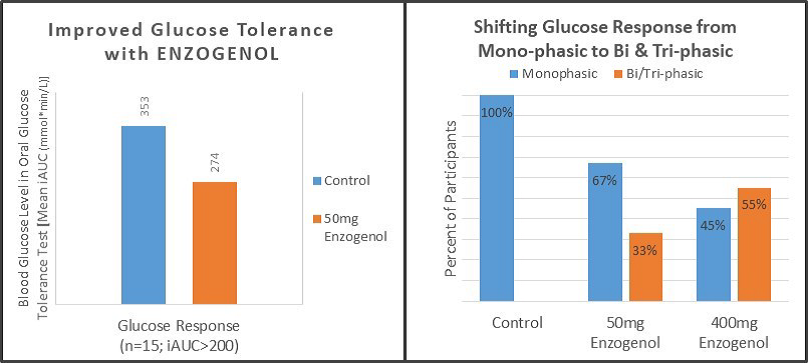Mar 02
![]() ENZOGENOL® Improves Glucose Tolerance
ENZOGENOL® Improves Glucose Tolerance
Poor diets with high intakes of refined sugars have been leading to an epidemic of obesity, glucose intolerance and diabetes. Ensuring optimal blood glucose control can therefore be an uphill battle that many people have lost or have given up on.
The tight control of blood glucose levels is an important function of a healthy metabolism that our body depends on. Losing this ability is a very gradual and slow process that ultimately leads to impaired glucose tolerance, and in the worst case to type-2-diabetes. Long before we become glucose intolerant our ability to handle the sugar we eat can already be sub-optimal.
New research has now shown that ENZOGENOL® - New Zealand Pine Bark Extract can improve glucose tolerance in generally health, non-diabetic people. This clinical study has shown that people with a sub-optimal glucose response, 75% of the individuals in the study, benefited from ENZOGENOL® consumption at a dose as small as 50mg with an improved post-prandial glucose response in a 2-hour oral glucose tolerance test, and with a shift from sub-optimal mono-phasic blood glucose response to improved bi- and tri-phasic responses.

This study has revealed that the majority of individuals having sub-optimal glucose responses can improve their body’s ability to clear glucose from the blood stream by taking as little as 50mg of ENZOGENOL® prior to meal time. This finding applies to generally healthy people that do not have diabetes already. Hence, ENZOGENOL® may help to lower the risk of developing impaired glucose tolerance, which is a precursor to diabetes.
ENZO Nutraceuticals Limited has filed for patent protection of these new exciting findings with the International Patent Office in New Zealand, and intends to protect the use of pine bark extract as a blood glucose tolerance improving agent worldwide.
ENZO Nutraceuticals Limited is very excited about this new application that can potentially help to curb the rising diabetes epidemic not by standing at the bottom of the cliff offering another diabetic treatment, but rather by helping people around the world to achieve optimal glucose tolerance and preventing glucose impairments and pre-diabetes in the first place.
![]() ENZOGENOL® Improves Glucose Tolerance
ENZOGENOL® Improves Glucose Tolerance
